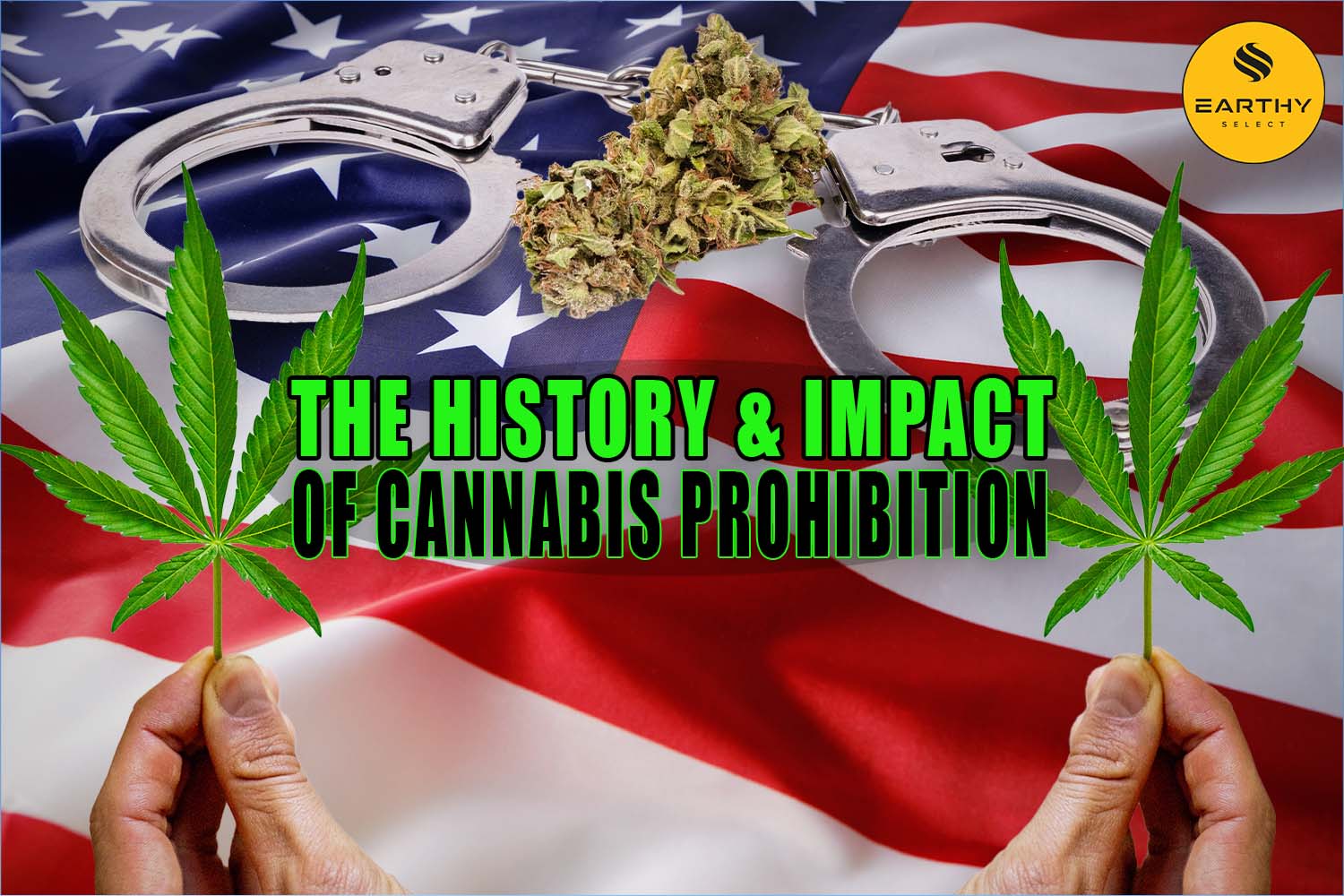The History and Impact of Cannabis Prohibition
Cannabis prohibition is one of the most significant and controversial aspects of modern drug policy. From the plant’s early use for medicinal and recreational purposes to its widespread criminalization, the history of cannabis prohibition is complex and wrought with injustice. Shaped by racial, social, and political factors, the tale of cannabis prohibition offers insight not only into the past but into the future of cannabis law [1]. This article explores the history and impact of cannabis prohibition, highlighting key events, federal legislation, and the ongoing debate over cannabis legalization.
Early use of cannabis
The cannabis plant, particularly Cannabis sativa and Cannabis indica, has been used for thousands of years for medicinal and recreational use. For example, ancient civilizations such as those in China, India, and the Middle East recognized the medical use of cannabis, employing it to treat various ailments. As cannabis made its way to Western societies, many individuals used it recreationally, spiritually and more recently under medical supervision for conditions related to epilepsy [2].
The onset of cannabis prohibition
The early 20th century marked a significant shift in the perception of cannabis, particularly in the United States. For instance, the influx of Mexican immigrants in the early 1900s introduced a wave of recreational marijuana use, which quickly became associated with immigrant communities. Indeed, this racialization of cannabis use fueled negative stereotypes and laid the groundwork for cannabis prohibition [3].
In 1937, Congress passed the Marihuana Tax Act, marking the beginning of widespread marijuana prohibition in the United States. Notably, the act did not outlaw cannabis outright but imposed heavy taxes and strict regulations on its production, distribution, and use. As a result, the policy effectively discouraged legal transactions regarding cannabis. In essence, the federal government used the Marijuana Tax Act as a tool to control and stigmatize cannabis, framing it as one of many dangerous drugs [4].
The Uniform State Narcotic Act of 1934 further strengthened state-level cannabis laws, aligning them with federal law. Hence, the federal bureau, tasked with enforcing these regulations, played a pivotal role in the criminalization of cannabis, leading to outlawed cannabis across the United States [5].
Is Hemp-Derived Delta-9 THC Legal?
The impact of cannabis prohibition
The consequences of cannabis prohibition have been profound, particularly within the criminal justice system. For example, the Comprehensive Drug Abuse Prevention and Control Act of 1970, which included the Controlled Substances Act, classified cannabis as a Schedule I substance. In other words, the act grouped cannabis with illegal drugs like heroin and LSD. This classification deemed cannabis to have a high potential for drug abuse with no accepted medical use. As a result, those in violation faced harsh criminal penalties for marijuana offenses [6].
The Anti-Drug Abuse Act of 1986 introduced mandatory minimum sentences for drug-related offenses, disproportionately affecting minority communities. Indeed, these mandatory penalties led to a surge in marijuana possession arrests and marijuana-related incarcerations, contributing to the United States’ problem of mass incarceration [7].
Also, the economic impact of marijuana prohibition has been significant. For example, marijuana sales were driven underground, creating an illicit market that fueled organized crime and violence. Hence, the illegal drugs trade, including illicit marijuana, became a lucrative enterprise for drug kingpins, further complicating efforts to control drug use [7].
The shift toward legalization
Despite enduring marijuana prohibition at the federal level, efforts to legalize cannabis gained momentum over the last few decades. The 1996 legalization of medical marijuana in California marked a turning point in the debate over cannabis. Notably, this shift was driven by growing evidence of cannabis’s efficacy in helping people with various medical conditions, challenging the federal government’s stance on its lack of accepted medical use [8].
At this point, the American Medical Association and other organizations began advocating for the reclassification of cannabis to allow for its medical purposes. In time, a growing body of published research from reputable sources like Cambridge University Press and Oxford University Press pushed for legal access to medical cannabis [9].
As more states passed medical marijuana laws, the debate expanded to include recreational marijuana. Eventually, states like Colorado and Washington became pioneers in the movement to legalize recreational marijuana, setting the stage for a broader shift in cannabis laws. Today, tens of millions of Americans live in states where recreational cannabis is legal [1]. Ultimately, these changes reflect a significant shift in public attitudes toward cannabis use [10].
THCa and State Compliance: Is It Legal in My State?
The 2018 Farm Bill, federal legality of hemp, and changing attitudes
The 2018 Farm Bill marked a pivotal moment in the shifting attitudes toward cannabis cultivation and use in the United States. More specifically, by legalizing the cultivation of industrial hemp—defined as cannabis with less 0.3% Selta-9 THC or less—the bill separated hemp from marijuana [11]. This legislation opened the door for widespread hemp cultivation and production.
Moreover, the passage of the 2018 Farm Bill played a significant role in altering public perception of cannabis [10]. Indeed, by legalizing a form of the cannabis plant, the bill helped to normalize the broader conversation around cannabis use and regulation.
2024 Farm Bill: What Changed, What Stayed the Same?
The ongoing federal-state conflict
While many states have moved to legalize marijuana, the federal government has maintained its prohibitionist stance. As a result, this conflict between state law and federal law has created legal and logistical challenges. For example, businesses operating legally under state law may face the risk of federal prosecution. Also, banking regulations often prevent these businesses from accessing traditional financial services [12].

Currently, the Justice Department grapples with how to enforce federal laws in states where cannabis is legal. Although the Obama administration adopted a more lenient approach, prioritizing other drug-related offenses over cannabis, the Trump administration signaled a return to stricter enforcement [13]. Ultimately, this uncertainty continues to affect the cannabis industry and the broader debate over marijuana legalization.
Federally compliant cannabis products from Earthy Select
For those who seek top-quality, organic cannabis products, Earthy Select provides a wide variety in an assortment of product lines that are ready to ship to you!
- THCa Flower Eighths, Quarters, Pounds: Containing abundant cannabinoids and terpenes, Earthy Select’s potent THCa Flower harnesses the plant’s full potential.
- Vape Products: Earthy Select’s Delta-8 THC premium vape cartridges and disposable vape pens feature a rich blend of cannabis terpenes for optimal flavor and effects.
- Cannabis Edibles: Delta-8, Delta-9, and Delta-10 Gummies are potent and made with all-natural ingredients. They offer an easy and delicious cannabis experience, and users report feelings of relaxation, euphoria, increased creativity, and pleasure.
Earthy Select THCa concentrates:
- Bubble Hash: Made through an ice-water extraction, this potent THCa hash satisfies the most discerning of cannabis concentrate connoisseurs.
- Diamonds: These sparkling THCa diamonds pack a full gram of concentrated THCa and .3 grams of live resin CBD sauce, terpenes, and other minor cannabinoids. 99.9% THCa!
- Live Rosin: Enthusiasts love Earthy Select’s powerful THCa rosin. Extracted from trichome-rich cannabis plants, this buttery treat is pure, potent, and flavorful.
Psychoactive vs Psychedelic: The Impact of Delta-9 THC
Global perspectives on cannabis prohibition
The United States is not alone in grappling with the legacy of cannabis prohibition. Indeed, many countries have their own histories of drug policy shaped by international treaties and domestic concerns. However, as the movement to legalize cannabis gains traction globally, these countries face similar challenges in balancing federal regulation with evolving public attitudes.
The Legal Status of Cannabis Around the World: What You Need to Know
Hence, international organizations like the American Public Health Association have called for a reevaluation of cannabis regulations. More specifically, they emphasize the need for evidence-based policies prioritizing public health over punitive measures [14]. Countries like Canada and Uruguay have already taken steps to legalize recreational marijuana. As a result, these countries provide models for other nations considering similar reforms [15].
The future of cannabis policy
As the movement to legalize marijuana continues to grow, the future of cannabis policy remains uncertain. On the one hand, the potential for full marijuana legalization at the federal level appears achievable. With advocates emphasizing the benefits of a regulated cannabis market and the clarity to address the harms caused by prohibition, many cannabis enthusiasts are hopeful [16].
However, challenges remain. These include lingering negative attitudes about cannabis. Also, experts highlight the need for comprehensive research into the long-term effects of cannabis use. Lastly, lawmakers urge the development of a regulatory framework that balances public safety with personal use [17].
As more states move to legalize recreational marijuana and medical cannabis, the pressure on the federal government to reform cannabis laws will likely increase [17]. Whether through legislative change or shifts in enforcement priorities, cannabis regulation in the United States is poised for transformation.
Key takeaway: the impact of cannabis prohibition
The history and impact of cannabis prohibition are deeply intertwined with broader issues of race, social justice, and public policy. From the Marihuana Tax Act of 1937 to the ongoing debate over marijuana legalization, the story of cannabis in America reflcts the nation’s evolving attitudes [1]. As the movement to legalize cannabis gains momentum, the future of cannabis policy holds far-reaching implications for society as a whole.
Visit Earthy Select for potent, federally compliant cannabis products delivered to your door!
Medical Disclaimer / Legal Disclaimer – Information is provided for educational purposes. It does not and is not intended to constitute legal advice or medical advice. We attempt to be accurate and up-to-date, but the legality of cannabinoids and the science of cannabis are evolving. The author is neither a legal professional nor a medical expert. Before buying or using any products, you should check with your local authorities and medical providers.
References
- Wikipedia: Legal History of Cannabis in the United States
- A Brief Global History of the War on Cannabis
- Mexicans and the Origins of Marijuana Prohibition in the United States
- History of Marijuana Regulation in the United States
- Origins of Marijuana Prohibition in the US
- Wikipedia: Controlled Substances Act
- America’s War on Marijuana-Timeline
- Medicinal Cannabis Guidelines in California
- Pharmacology and Effects of Cannabis: A Brief Review
- Cannabis Use, Attitudes, and Legal Status in the U.S
- Hemp and the 2018 Farm Bill
- Legal Challenges for Cannabis Businesses
- Trump Administration Drops Obama-Era Easing of Marijuana Prosecutions
- A Public Health Approach to Regulating Commercially Legalized Cannabis
- The Efficiency of Marijuana Legalization: Uruguay vs Canada
- Federal Legalization of Marijuana May Be Closer Than You Think
- Marijuana’s New Legal Status Must Spark More Research
Frequently Asked Questions
How has cannabis prohibition affected the criminal justice system?
Cannabis prohibition has significantly contributed to mass incarceration, disproportionately impacting minority communities. Indeed, harsh penalties for marijuana possession and use have led to thousands of arrests and long prison sentences. Notably, these practices have exacerbated racial disparities within the criminal justice system [2].
What are the effects of historical cannabis prohibition?
Cannabis prohibition has stifled potential economic growth by preventing the development of a legal cannabis industry. Moreover, the illicit market that arose as a result of prohibition has fueled organized crime. In contrast, the legal industry in states where cannabis is now permitted shows the potential for job creation, tax revenue, and economic revitalization [4].
How has cannabis prohibition influenced public perception of marijuana?
Prohibition has historically stigmatized marijuana and hemp use, associating it with criminality and moral decline. However, as more research emerges on the medical benefits of cannabis, public perception has shifted. As a result, more of the public supports cannabis legalization and regulated use [4].



